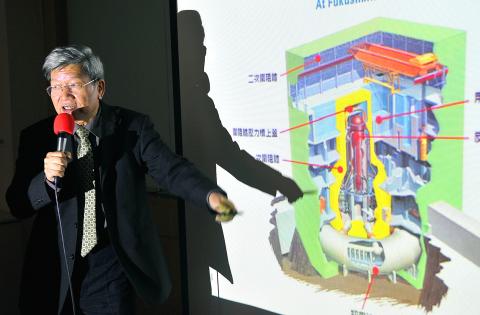A former government nuclear official yesterday said that Taiwan should abandon nuclear power because it is not capable of handling nuclear waste and its regulation of nuclear activity and radiation has been awful.
“People called me a nuclear expert with a conscience, a good person. Not that I am a good guy, but the fact is that [government officials in charge of nuclear affairs] are bad guys,” said He Li-wei (賀立維), a nuclear expert who used to work at the Atomic Energy Council’s Institute of Nuclear Energy Research.
In a seminar on nuclear risk assessment organized by several anti-nuclear civic groups, He, who holds a doctorate in nuclear engineering from Iowa State University, described himself as someone who was looking for redemption with his anti-nuclear efforts.

Photo: Chien Jung-fong, Taipei Times
He delivered a 30-minute briefing on Taiwan’s nuclear waste disposal predicament, saying that the nation’s nuclear power plants would consume 30,000kg of uranium over their 40-year lifespan, compared with the 1kg of uranium in the “Little Boy” atomic bomb that the US dropped on Hiroshima in 1945.
“By the time the three active nuclear power plants are decommissioned, they will have consumed more than 4,500 tonnes of uranium and we have no idea how to deal with the spent nuclear fuel,” he said.
Unlike Finland, which stores its nuclear waste 500m underground, the situation has been especially difficult for Taiwan, which neither has the technology to handle nuclear waste nor an appropriate storage location.
What is worse has been government officials’ lies about nuclear radiation levels on Lanyu (Orchid Island, 蘭嶼), where low-level nuclear waste is stored, and the government’s lack of transparency, He said.
He said the activities of the “nuclear power community” — including National Tsing Hua University’s nuclear engineering department, Taiwan Power Co (Taipower) and the council — as something akin to “organized crime” because the council has been awarding research projects to Tsing Hua professors or retired Taipower and nuclear power plant executives as favors. These people cover up the flaws in the nuclear power plants in return, he said.
The now retired He said many professors and government officials had been his students and he “should have flunked them in my class because scientists are supposed to speak the truth, not twist data or cover up mistakes.”
Two Japanese, Katsumi Nakao of J.F. Oberlin University and Yoh Kato of Tokyo Metropolitan University, also spoke at the seminar about the handling of the Fukushima Dai-ichi nuclear power plant disaster.

The Mainland Affairs Council (MAC) today condemned the Chinese Communist Party (CCP) after the Czech officials confirmed that Chinese agents had surveilled Vice President Hsiao Bi-khim (蕭美琴) during her visit to Prague in March last year. Czech Military Intelligence director Petr Bartovsky yesterday said that Chinese operatives had attempted to create the conditions to carry out a demonstrative incident involving Hsiao, going as far as to plan a collision with her car. Hsiao was vice president-elect at the time. The MAC said that it has requested an explanation and demanded a public apology from Beijing. The CCP has repeatedly ignored the desires

Many Chinese spouses required to submit proof of having renounced their Chinese household registration have either completed the process or provided affidavits ahead of the June 30 deadline, the Mainland Affairs Council (MAC) said on Thursday. Of the 12,146 people required to submit the proof, 5,534 had done so as of Wednesday, MAC deputy head and spokesperson Liang Wen-chieh (梁文傑) said. Another 2,572 people who met conditions for exemption or deferral from submitting proof of deregistration — such as those with serious illnesses or injuries — have submitted affidavits instead, he said. “As long as individuals are willing to cooperate with the legal

The Ma-anshan Nuclear Power Plant’s license has expired and it cannot simply be restarted, the Executive Yuan said today, ahead of national debates on the nuclear power referendum. The No. 2 reactor at the Ma-anshan Nuclear Power Plant in Pingtung County was disconnected from the nation’s power grid and completely shut down on May 17, the day its license expired. The government would prioritize people’s safety and conduct necessary evaluations and checks if there is a need to extend the service life of the reactor, Executive Yuan spokeswoman Michelle Lee (李慧芝) told a news conference. Lee said that the referendum would read: “Do

The Ministry of Environment yesterday held a seminar in Taipei for experts from Taiwan and Japan to exchange their experiences on the designs and development of public toilets. Japan Toilet Association chairman Kohei Yamamoto said that he was impressed with the eco-toilet set up at Daan Forest Park, adding that Japan still faces issues regarding public restrooms despite the progress it made over the past decades. For example, an all-gender toilet was set up in Kabukicho in Tokyo’s Shinjuku District several years ago, but it caused a public backlash and was rebuilt into traditional men’s and women’s toilets, he said. Japan Toilet Association